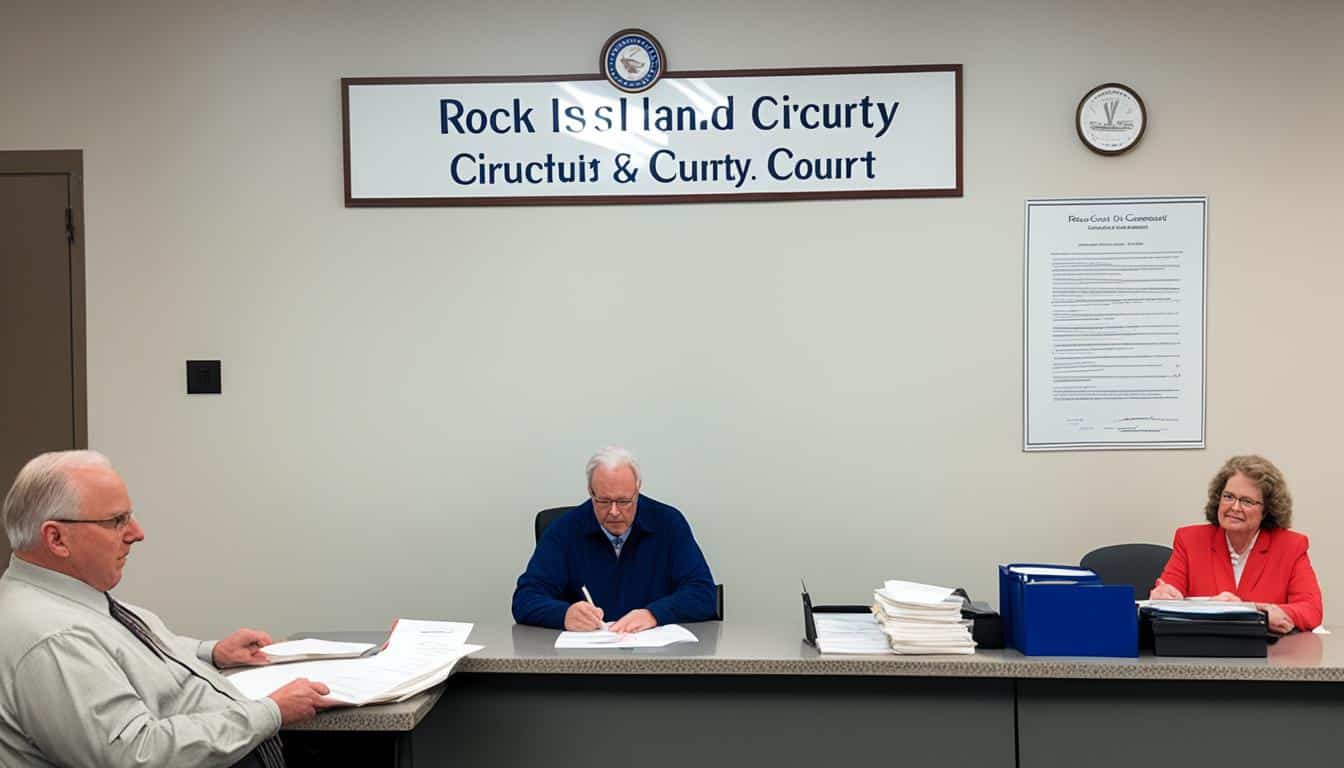Physical Address
304 North Cardinal St.
Dorchester Center, MA 02124
Physical Address
304 North Cardinal St.
Dorchester Center, MA 02124

Filing for divorce in Rock Island County, IL, might seem like a maze without a map. You’re not just ending a chapter; you’re starting fresh. But where do you begin? Let’s break it down, making the process less intimidating.
Picture this: you’re equipped with the right knowledge, stepping into a new phase of life confidently. This guide is your first step. We’ll walk through the essentials, from legal requirements to necessary paperwork. Curious about what comes next?

Keep reading to navigate the complexities of filing for divorce in Rock Island County. It’s time to turn the page. Let’s dive in.
To get more info on filing for divorce in Illinois, find a detailed overview in our article, How to File for Divorce in Illinois.
Before filing for divorce in Rock Island County, it’s important to understand the eligibility requirements. This includes residency requirements and grounds for divorce.
In order to file for divorce in Rock Island County, at least one of the spouses must meet the residency requirements. The petitioner or the respondent must have been a resident of Rock Island County for at least 90 days before filing for divorce.
Rock Island County recognizes “irreconcilable differences” as the only ground for divorce. This means that the marriage has broken down beyond repair, and there is no possibility of reconciliation. Irreconcilable differences may include issues such as disagreements, conflicts, or a breakdown in communication.
Understanding the residency requirements and grounds for divorce is essential before initiating the divorce process in Rock Island County. By fulfilling the residency requirements and establishing irreconcilable differences, you can determine if you are eligible to file for divorce in Rock Island County, IL.
| Residency Requirements | Grounds for Divorce |
|---|---|
| At least one spouse must be a resident of Rock Island County for at least 90 days prior to filing for divorce. | The only recognized ground for divorce in Rock Island County is “irreconcilable differences,” which signifies a breakdown in the marriage with no possibility of reconciliation. |
In Rock Island County, the only recognized ground for divorce is irreconcilable differences. This means that the marriage has broken down beyond repair and there is no possibility of reconciliation. Irreconcilable differences refer to significant issues or disagreements between spouses that make it impossible for them to continue their marital relationship.
Unlike other counties or states, Rock Island County does not require spouses to provide specific reasons for their divorce. As long as both parties agree that their marriage has irretrievably broken down, they can file for divorce based on irreconcilable differences.
It’s important to note that proving fault or assigning blame is not necessary when filing for divorce based on irreconcilable differences. This ground for divorce recognizes that marriages can deteriorate due to various reasons, and the focus is on the irreparable breakdown rather than assigning fault.

When filing for divorce in Rock Island County, it’s crucial to understand the specific requirements and procedures involved. Consulting with an experienced divorce attorney can help ensure that you comply with all the necessary legal steps and make the process smoother.
Filing for divorce in Rock Island County involves several steps. In this section, we will provide a comprehensive guide on how to file for divorce in Rock Island County, including the necessary paperwork, court procedures, and timelines. We will walk you through each step of the process, ensuring that you have a clear understanding of what is required and how to proceed.
Divorce can be a challenging and emotional process, but understanding the steps involved can help make the filing process in Rock Island County IL more manageable. By following these steps and seeking appropriate legal guidance if needed, you can navigate the divorce process with confidence.
Filing for divorce in Rock Island County requires the payment of certain fees. It’s important to be aware of the filing fees associated with the divorce process. Understanding these fees will help you budget and prepare for the financial aspect of your divorce.
| Service Description | Fee |
|---|---|
| Filing Fee | $316.00 |
| Respondent Entry of Appearance Filing Fee (after case number is assigned) | $189.00 |
| Family (Parentage Act – Challenge or Petition for Confidential Intermediary) | $0.00 |
The filing fees for divorce in Rock Island County IL may vary depending on various factors, such as the type of divorce and court fees. Here is an overview of the common filing fees:
Divorce costs in Rock Island County IL can vary depending on the complexity of the case and whether you choose to hire legal representation or handle the process on your own. According to the most recent data available, $306 is required to file for divorce. It’s important to consider these costs when planning for your divorce.
Remember, these fees are subject to change, and it’s always a good idea to consult with the Rock Island County Courthouse or a legal professional for the most accurate and up-to-date information regarding the filing fees for divorce in Rock Island County IL.
For individuals who are unable to afford the filing fees for divorce in Rock Island County, there may be options for obtaining a fee waiver. In this section, we will explore the eligibility criteria for a fee waiver and the process for obtaining one in Rock Island County.
If you are facing financial hardship and are unable to pay the fees required to file for divorce in Rock Island County, you may be eligible for a fee waiver. The fee waiver is intended to provide access to the divorce process for those who cannot afford the associated costs.
The eligibility criteria for a fee waiver vary from county to county, but in Rock Island County, there are certain guidelines that determine who qualifies for this assistance. Typically, eligibility is determined based on income and assets. If your income falls below a certain threshold, you may be eligible for a fee waiver.
The process for obtaining a fee waiver in Rock Island County involves submitting an application to the court. The application will require you to provide detailed information about your financial circumstances, including your income, expenses, and assets. It is important to be thorough and honest when completing the application, as any inaccuracies could lead to the denial of your request.
Once your application is submitted, it will be reviewed by the court. If your application is approved, you will receive a fee waiver, and the court will waive the filing fees for your divorce case. This can provide significant financial relief for individuals who are struggling financially.
It’s important to note that a fee waiver is not guaranteed, and the decision to grant or deny a waiver is ultimately up to the court. However, if you can demonstrate that you meet the eligibility criteria and are facing financial hardship, you have a good chance of being approved for a fee waiver.
If you believe you may be eligible for a fee waiver, it is recommended to consult with a divorce attorney or contact the Rock Island County courthouse for more information on the specific requirements and application process.
The court is located at:
1317 3rd Ave Suite 101, Rock Island, IL 61201, United States
If you’re considering filing for divorce in Rock Island County and want to save on legal fees, you have the option to file without an attorney. Although hiring an attorney can provide valuable guidance and support, self-representation can be a cost-effective alternative if you feel confident in navigating the process on your own.
DIY divorce in Rock Island County IL
A DIY divorce, also known as a do-it-yourself divorce, allows you to handle the legal aspects of your divorce without the assistance of an attorney. This can be a suitable option if you and your spouse have reached an agreement on important matters such as child custody, property division, and spousal support. However, it’s essential to thoroughly understand the legal requirements and procedures involved.
Self-representation in divorce in Rock Island County IL
Self-representation means that you will be responsible for completing and filing all necessary forms, attending court hearings, and representing yourself throughout the divorce process. Before proceeding with self-representation, it’s crucial to educate yourself about the specific requirements and rules of the Rock Island County court system.
Keep in mind that divorce laws can be complex, and it’s advisable to consult resources such as the Rock Island County Court website, local legal clinics, or self-help legal guides that provide step-by-step instructions tailored to your jurisdiction. These resources can help you understand the required forms, deadlines, and courtroom procedures to ensure a smooth divorce process.
To see how this process of filing for divorce in Rock Island County compares to that in other Illinois counties, check out our articles about how to file for divorce in Peoria County and filing for divorce in St. Clair County.